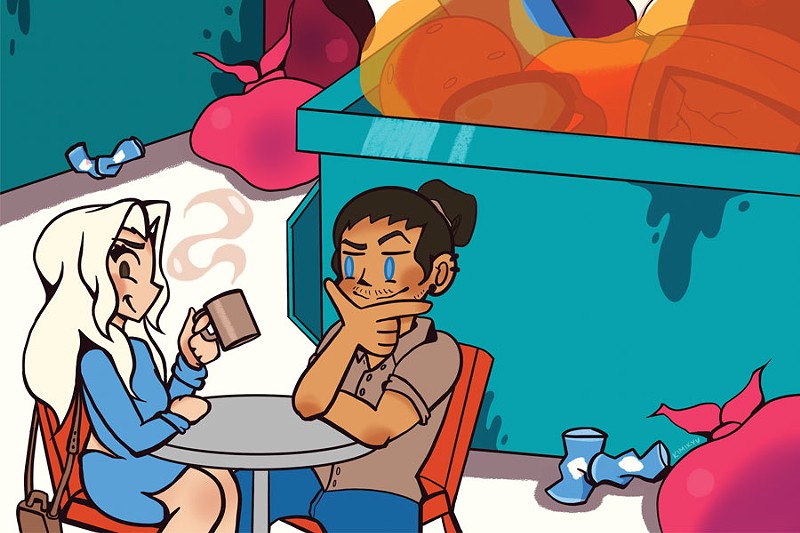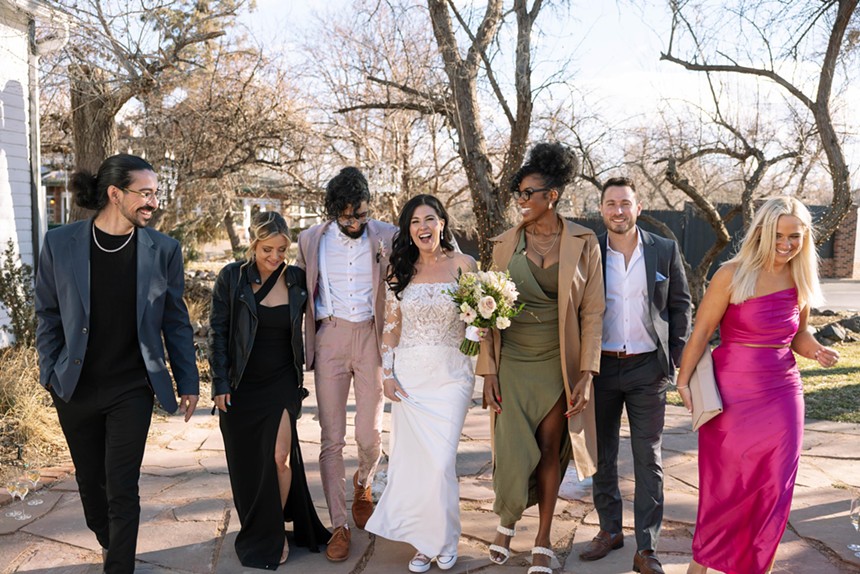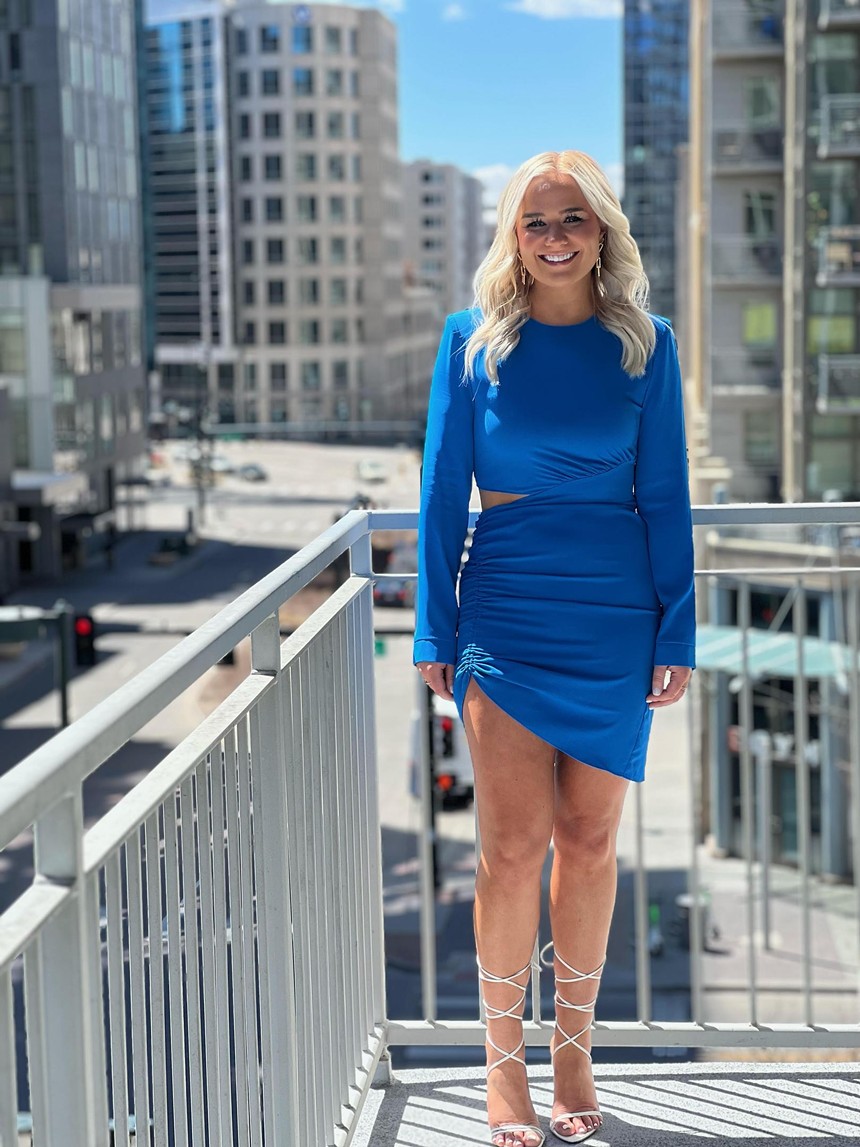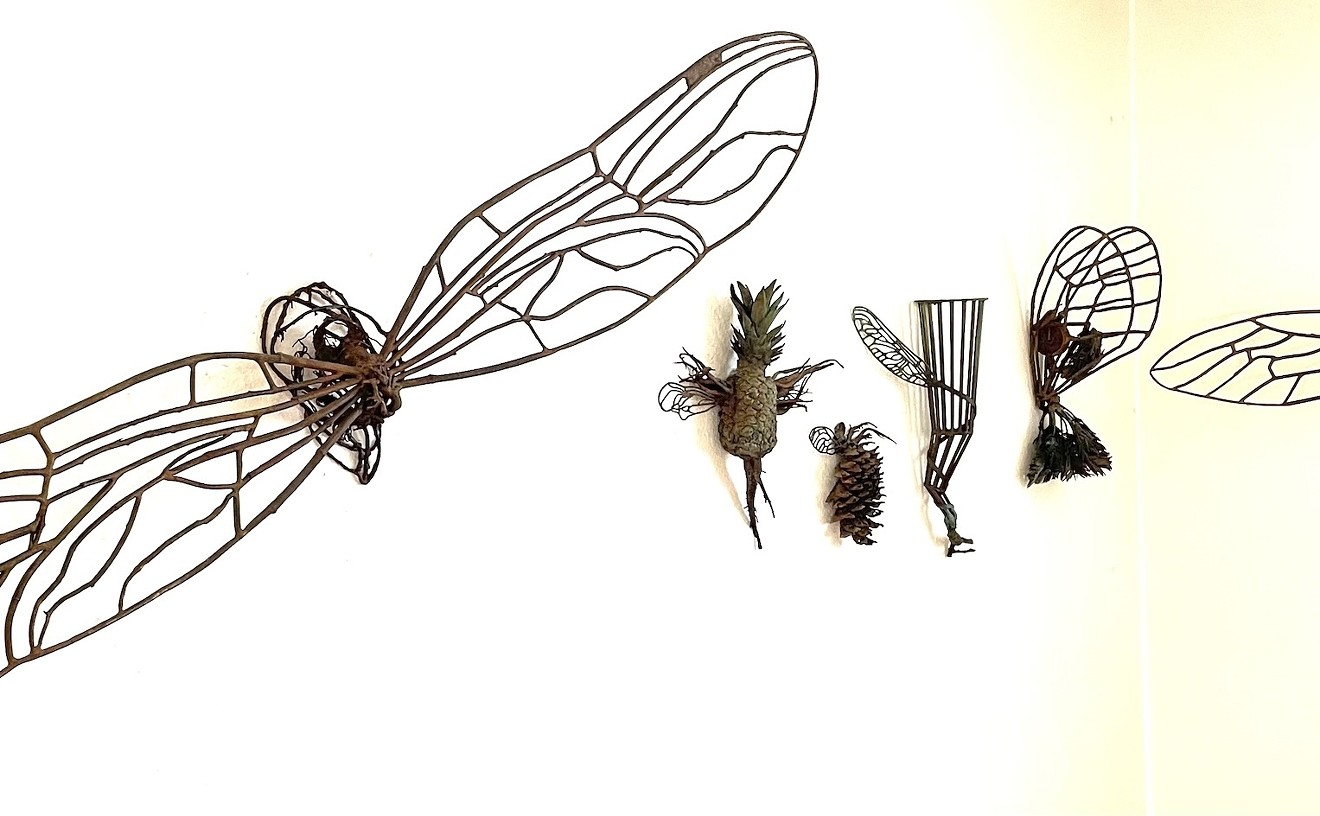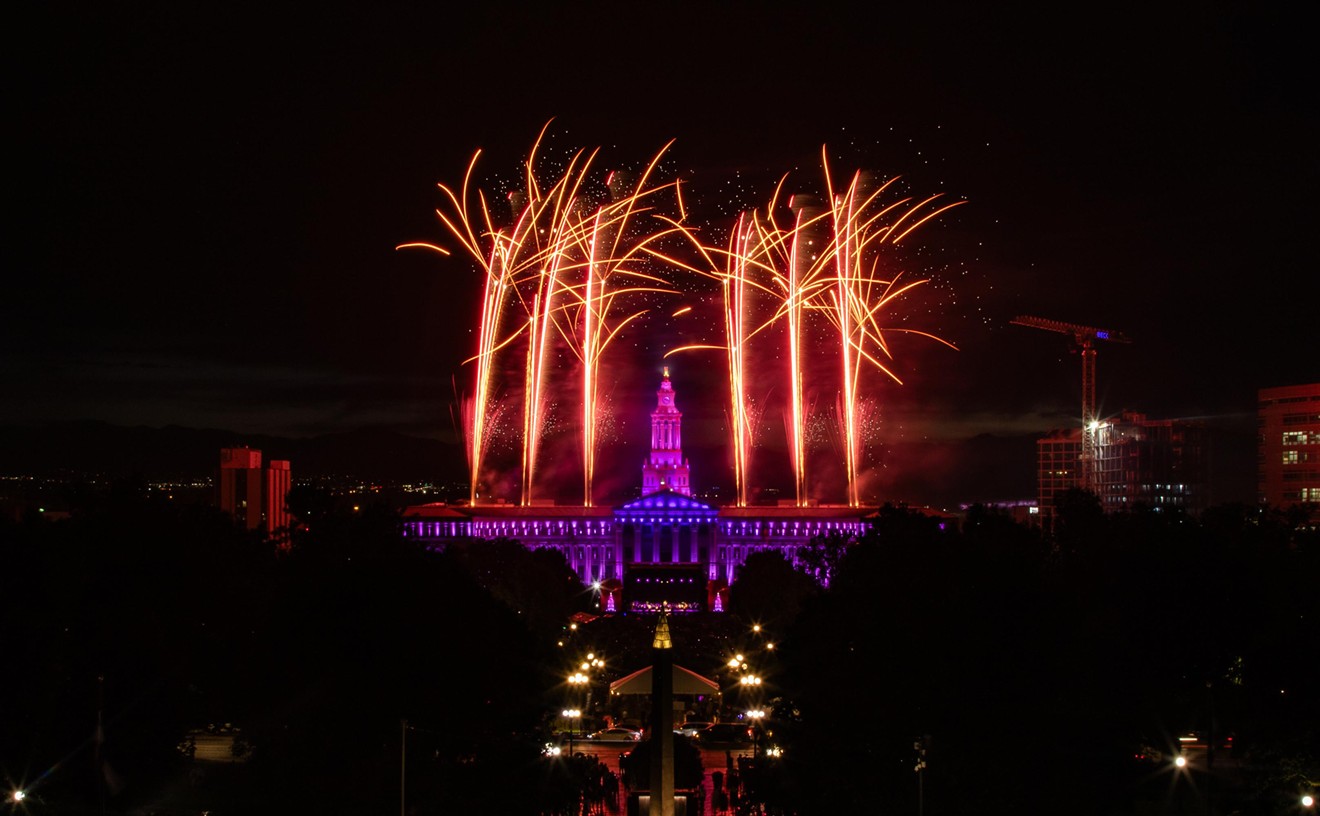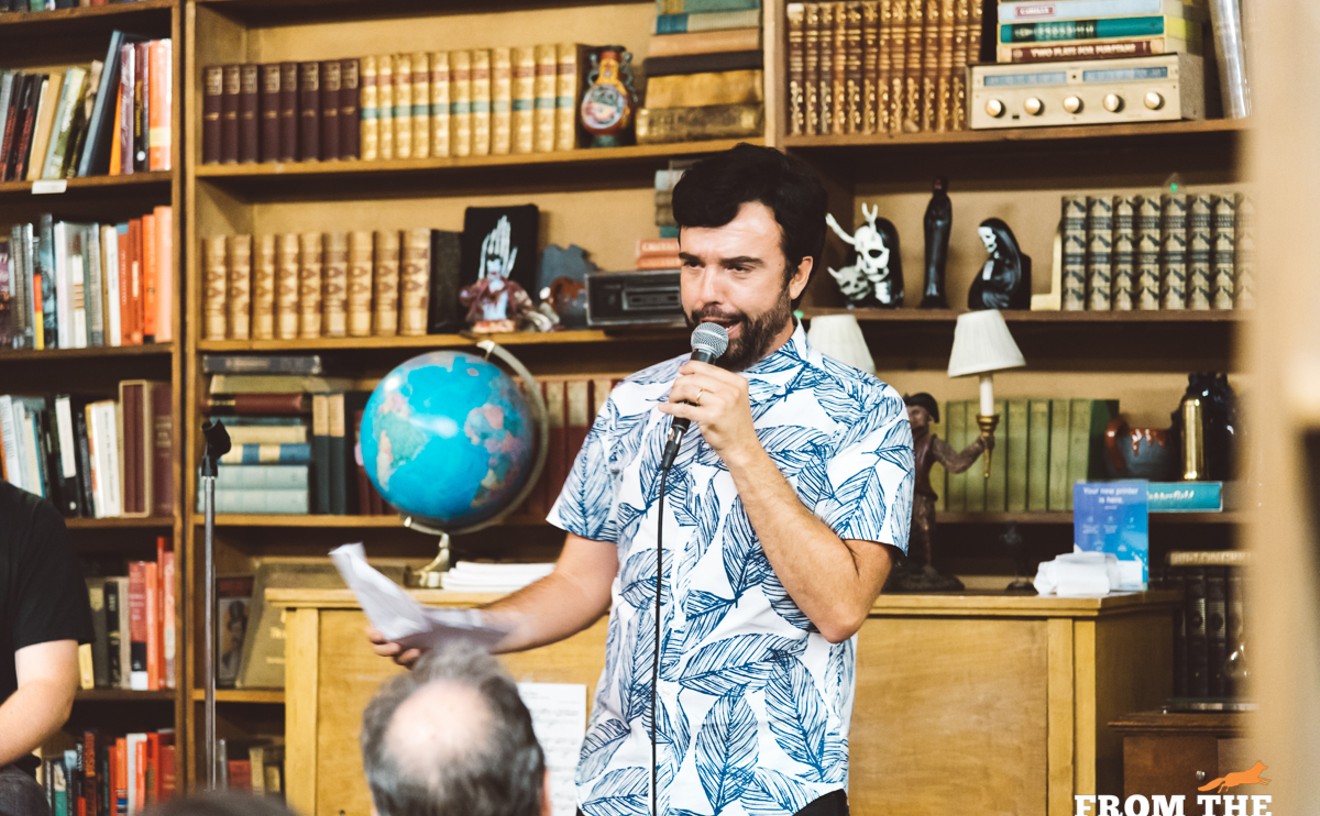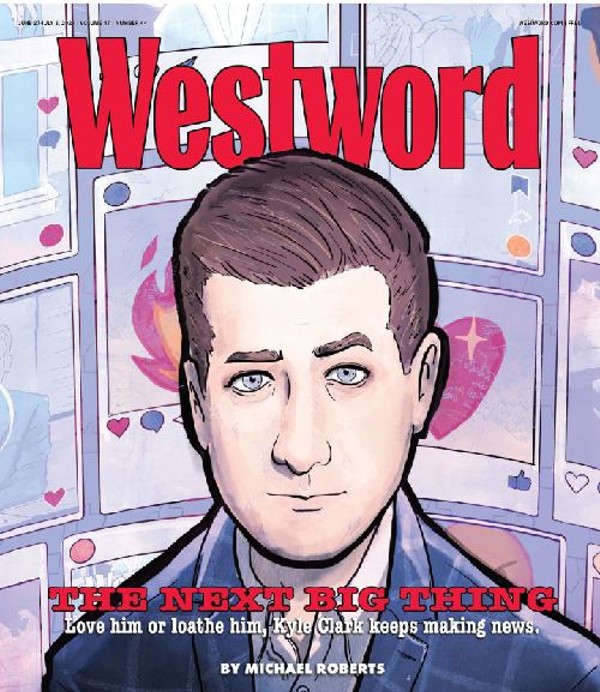Frustrated with the romantic prospects in Chicago, Balch packed her bags and headed to Denver in search of the "down-to-earth, good-looking mountain men" who she heard abounded in the Mile High City. Her move eventually landed her on the first Denver-based season of the reality-TV dating show Married at First Sight.
Like Balch, the show's so-called relationship experts were optimistic about finding love in Denver, boasting on the premiere episode that viewers would soon flock to the "heaven on Earth" that is "Menver" to snatch up its hordes of eligible bachelors. But what followed was the least successful season the show has ever had; for the first time, none of the marriages lasted until the reunion episodes, a contestant was left at the altar, and one couple divorced in a near-record thirteen days.
"It was a dumpster fire," says Balch, whose marriage on the show also went up in flames (read our Q&A with Balch here). "But I think it is actually a very true depiction of the dating culture right now."
While Denver has topped several "best cities for singles" lists in recent years, many local singles say the city is really the worst. When Married at First Sight's Mile High experiment failed miserably — and as Love Is Blind began filming its first Denver season — residents flooded Westword's comment section with one question: Who the hell thought doing a dating show in Denver was a good idea?
Anyone who has dated in Denver could have told you that would be the result, readers said. Denver is the worst place to find love. ... If you’re in a happy relationship, don’t move here, this is where it ends. ... As someone born and raised in Denver, I have come to terms that I will be alone for the rest of my life.
But is all of the doom and gloom justified? Westword spoke to Denver's very own relationship experts to find out.
Short Answer...Maybe
Over the past fourteen years, April Davis has served clients from every corner of the United States through her company, LUMA Luxury Matchmaking. She says that no matter where they live, everyone thinks their city's dating scene is the reason for their struggling love life. But in Denver's case, it could be partially true."[Denver is] worse for people seeking a serious, committed relationship," Davis says, noting that she's found people here to be less interested in settling down romantically. “Peter Pan syndrome definitely exists in Denver more so than other places.”
Denver has developed a reputation as a transitional city, she notes. People move here to have fun and enjoy the outdoors before inevitably moving somewhere else to find a serious relationship and plant roots. Nationally, Colorado had the sixth-most new residents from other states in 2020, and the bulk of the people moving into the state are young adults from Generation Z.
Davis offers the stereotypical Coloradan snowboarder as an example of the noncommittal men she sees in her line of work. “What do you call a snowboarder with a girlfriend?" Davis jokes. "Homeless," because getting a place to stay is the only reason they'd be willing to get into a relationship.
“You don’t go fishing for trout in a pool," Davis says. "A lot of times, women are looking for these white-collar, sharp-dressed, successful, driven businessmen. There are not as many of those. ... That man is going to wear Patagonia in Denver.”
Erica Arrechea of Cinqe Matchmaking has made a similar observation: While many Coloradans don't prioritize serious relationships, those who do may be too picky for the limited population they're working with. "Denver is actually a really small town," Arrechea says. "There's only a very small pool of people who are in your age demographic and who are professional and who are looking for something long-term."
Arrechea recently matched an older Denver man who is handsome, successful, tall and athletic, but struggled to find a partner on his own because he was "looking for somebody who was just like him," she says. "There aren't a whole lot of people who are at his quality and who are exactly what he's looking for."
Michele Fields has had many over-particular clients in the 35 years that she's run her Colorado-based company, Bon Jour Matchmaking Service — including some who came to Denver in search of the outdoorsy lifestyle that Davis and Arrechea describe as a detriment to the city's dating scene.
"They didn't want to meet anyone who didn't ski, and at their [skill] level and as much as they did," Fields says. "Which is a ridiculous criteria. That's one thing. ... The criteria should be morals and values. But for a long, long time, people required who they met to do all the activities they did. That's just not realistic."
Fields recalls telling a date back in the ’80s that she didn't ski. "He said, 'Well, then, why'd you move to Denver?' What a stupid thing to say," she laughs. "I mean, get a life." But she says her clients have this issue less frequently today; she thinks the reduced pickiness is an indication that Denver's dating scene is improving.
At the same time, though, Fields notes that the demand for matchmaking services in the city has skyrocketed since 2000, even as free dating apps and websites are more popular than ever.
Build-A-Boyfriend Apps
After some fruitless meetups with people she met on dating apps, Karen Richards started scheduling her dates to take place in a grocery store. "So if the date was crummy, at least I would get my shopping done," she explains.That killing-two-birds-with-one-stone approach to dating is what eventually inspired her to start Two Birds Fit, a Denver-based matchmaking service where singles participate in exercise classes, speed-dating workouts or active events in order to meet one another. Even if they don't hit it off, they get a good workout.
"This is like my grocery store date, but now I can do it for everybody else," says Richards, who is also a personal trainer. "This is how I would like to be match-made myself."
Richards says she found online dating services like Tinder, Match and Bumble to be time-consuming and ineffective, with only one in ten dates turning out as good as "just okay." But apps have quickly become a leading tool in the modern search for romance. Three in ten U.S. adults have used a dating app, and that jumps up to 53 percent for adults under the age of thirty, according to the Pew Research Center. Last year, Fort Collins had the second-most Tinder searches in the country.
But while the prevalence of dating apps is clear, their success is still up for debate. Users are split on whether the apps are beneficial or not, with 46 percent of users reporting an overall negative experience and 53 percent reporting a positive experience, Pew Research found. The stats tip to 51 percent negative when looking at only women users.
"The mentality around dating apps was 'The grass is always greener,'" Richards says. "People were always just seeming like, 'Yeah, you’re cool, but are you cool enough?' My best experiences have always been meeting somebody in person.”
Eric Alstad has witnessed numerous dates while running the Thin Man, named Westword's best bar for a first date in 2023. The bar gets a boom in business early in the week that the staff refers to as "Tinder Tuesdays," he says, and when couples sit at the high tables across from the bar, the workers "have front-row seats."
Alstad says he sees several patrons bring new first dates to the bar each week. He knows one customer who conceived two children from two different one-night stands he met at the bar five years apart. But mostly, Alstad has seen people walk out in the middle of dates — a phenomenon more common in recent years than when the Thin Man first opened in 2001.
“People don’t mess around anymore," Alstad says. "If they don't think it's going to work, they want to be done with it and move on to the next one.”
Andy Bruch, owner of Westword's 2024 best first-date restaurant, Point Easy, says most of his regulars intentionally avoid bringing first dates to the restaurant so that they don't ruin their special spot if the date goes poorly. Instead, they retreat to Point Easy for solace afterward. He recalls one woman who came directly to Point Easy after a particularly terrible date. “How do you list your height as six feet tall when you’re five-foot-seven?" Bruch asks.
"There's the usual 'ghosting' after what seemed like a great date," he adds. "Integrity doesn't seem to be a big thing. ... At the older end of the spectrum, it's 'All my friends are divorced.' At the younger end, it's 'Apps are toxic; it's hard to meet somebody naturally.' It's just really tough out there."
Even for those who do achieve matches through dating apps, Davis fears the practice often leads people to view romantic partners as unlimited and disposable.
“We have this 'build-a-boyfriend' mentality. It's disillusioned people," Davis says. "You have to commit to the relationship. It's not about finding this person who has all these character traits and whether you can find somebody who is a little bit better. ... They’ll keep swiping forever because they’ve never really given anyone a true chance."
The Menver Myth
The "Menver" phenomenon was first reported in Westword back in 2006, when twenty-something transplants coined the term to describe the city's man-heavy singles market. Eight years later, Pew Research named Denver the second-best place for women to find eligible bachelors, with reportedly 101 single employed men for every 100 single women at the time.Today the ratio is about the same...but that's when you factor in all men, not just the available and employed ones. In Denver, 49.5 percent of the residents are female, according to U.S. Census data from 2018 to 2022; that's less man-heavy than the state overall, where the population is 49.2 percent female — compared to 50.4 percent female in the country at large.
Not all Denver women are seeking men. Around 7 percent of Colorado adults are part of the LGBT community, which leans female. But even if there are slightly more straight men in Denver than straight women, they're not all available. Colorado has among the highest marriage rates in the country, according to the National Center for Health Statistics. Its divorce rates also rank above average, but not quite as high.
While Richards says her Two Birds Fit meetups have resulted in hundreds of successful matches and at least one marriage, it's difficult to get male participants to show up.
"We attract a lot of females — fit, fun, outgoing females — and shockingly enough, I need to get the word out more to guys," she says. "They come, they show up, but it takes a little more effort. Which is a bit frustrating, because we have some really cool women here for you, guys. You have no idea how cool they are! Just show up!"
Arrechea says the ratio of people who contact her matchmaking company is ten women to one man, a similar figure to that reported by the other matchmakers.
“Men aren’t as motivated as women. Men don’t want to put as much effort in, or they don't want to seem like they need the help," Arrechea says. "They’ll go online with the worst photos that you’ve ever seen, and they don’t care.”
However, men do make up approximately 78 percent of Tinder users, the most popular dating app in the U.S. — though as the matchmakers point out, they may be seeking casual hookups over long-term relationships.
Still, many Denver men are looking for connection in other ways — even if not romantic. Project Man Cave launched an app in Denver last month to connect men seeking male friendships in Denver. A different platonic platform, Cuddle Comfort, has hundreds of active accounts located in Denver, with mostly male users signing up just to hug or cuddle a complete stranger, with explicit instructions that it cannot lead to any romantic or sexual contact. A Westword reporter received three cuddle requests within minutes of creating an account without any photos or identifying information.
This behavior tracks, considering that Colorado was deemed the second-loneliest state in the country in a 2024 study by Assurance IQ. The year before, Denver ranked as the 27th-loneliest city.
Facing the Dumpster Fire
Regardless of how bleak it may appear, unless Denver singles are ready to flee the city, they'll likely have to face the dating scene eventually. Luckily, there are changes they can make to boost their odds of success, the matchmakers say. And that's beyond resorting to a reality TV show.Arrechea suggests looking to past relationships or friends for setups. To meet someone new, join a group or find a hobby that you enjoy and do it by yourself instead of surrounded by an army of friends. Read a book at a park, grab a beer at a brewery alone, go to a concert solo. "There's no secret path," she says. "It’s really simple. You need to get out there."
While Alstad has watched many dates go awry at the Thin Man, he's also enjoyed numerous tales of marriages and children that resulted from connections made in his business — a lot of which started not on an app, but when people happened to meet in the bar.
"That still happens," he says. “I’ve got a lot of hope. People still find each other the old-fashioned way.”
Anyone who's not ready to leave the dating apps should be up front about their intentions, not write someone off just because the first date was awkward, and focus on a prospective partner's core values instead of materialistic interests or appearances, Davis says. And do not lie about anything on your dating profile, Fields adds, even your height.
Though younger clients have reached out to Fields for matchmaking services, she encourages singles in their early to mid-twenties to be patient and let connections come organically. "Leave the room. You don’t need a matchmaker at this age," she says. "If in ten years you’re still single, call me.”
Finally, don't let the abysmal results of Denver-based reality dating shows discourage real-life dating. Though not great, the city's dating prospects are not quite as bad as portrayed on TV.
"I don't think it's indicative of anything other than that people are willing to go through with getting married just so they can be on TV," Davis says, adding that reality dating shows reach out to her "at least once a week" for help casting. She says any matchmaking service that asks couples to get married after only knowing each other for a few weeks (as with Love Is Blind) or a few seconds (Married at First Sight) is simply "insane."
While Balch says she's taking a break from dating after her run on Married at First Sight — she's still in the process of getting divorced, after all — she encourages her fellow Denver residents to continue the push to find love.
"Face the dumpster fire," Balch says. "Keep putting yourself out there and keep learning each time."

